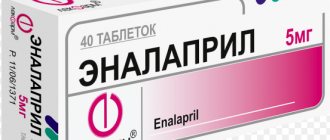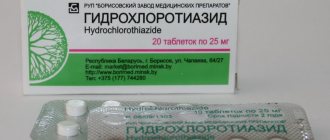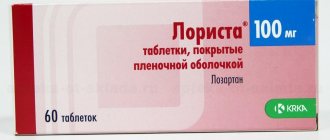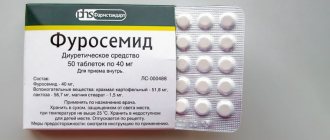Thiazide diuretics are first-line drugs in the treatment of arterial hypertension and abnormalities in the cardiovascular system, which makes them one of the main pharmaceutical agents.
The main effect, as the name suggests, is the removal of excess fluid. This type of medicine is otherwise called diuretics.
Thiazide diuretics are considered the safest and at the same time effective among this category of drugs. They are used in the treatment of arterial hypertension, heart failure and a number of other diseases.
However, like other diuretics, they are not suitable for independent use; they require precise dosing and constant dynamic monitoring of the patient’s condition. Prescription is the prerogative of the doctor.
Classification of diuretic drugs by mechanism of action
Doctors and researchers distinguish the following groups of diuretics:
- drugs that effectively act at the level of the tubules in the kidneys, for example, mercury diuretics - Diacarb, Bumetonide, Eplerenone and Indapamide;
- medications that significantly increase blood circulation in the kidneys - Zufillin and Aminophylline;
- herbal diuretics from strawberry fruits, birch buds and torment leaves.
Based on their composition, diuretics can be divided into the following large groups:
- loop preparations consisting of sulfonamide derivatives. Furosemide, Ethacrynic acid, Torsemide;
- thiazide drugs from derivatives of thiazide substances and sulfonamide. Clopamide, Hydrochlorothiade, Cyclomethisiade;
- potassium-sparing medications made from non-sulfonamide-type compounds. Triamterene, Amiloride, Aldactone;
- osmotic agents as sulfonamide derivatives. These are, first of all, solutions of sodium chloride and glucose, used as hypertensive drugs, as well as Mannitol.
Thiazide diuretics – what are they?
It is well known that any diuretic drugs negatively affect the salt balance in the body, since they remove a lot of useful substances during deurination. This complicates the functioning of the heart. Thiazide diuretics increase the excretion of urine from the body without limiting the patient's salt intake, even in cases of diagnosed heart failure.
The fundamental difference between diuretics of this group and the rest is a decrease in calcium production and an increase in sodium secretion in special parts of the nephron that are responsible for these processes. Thus, the exchange of sodium for potassium enzymes increases significantly, and it is excreted intensively through the genitourinary system.
All thiazide diuretics are taken in tablet form with plenty of water. The onset of action is noted within a couple of hours. The final withdrawal from the body will occur after 12 weeks of regular use.
The thiazide group is not as hard on the patient’s body as the loop group, due to which their effectiveness in time is reduced. But such diuretics are prescribed to absolutely everyone, except in cases of renal failure, in which the drug cannot overcome the resistance of the pathology.
More on the topic: How to take Trifas diuretic tablets?
Common combinations
Diuretics are rarely prescribed as monotherapy. To achieve a lasting effect with a minimum number of adverse reactions, they are combined with other antihypertensive drugs. These can be two separate tablets or a complex medicine containing 2 active ingredients. Combined use with ACE inhibitors, calcium antagonists, sartans are the most preferred combinations (1). It is also advisable to prescribe thiazide diuretics and beta blockers.
Common combination drugs
| Active ingredients | Tradename |
| valsartan + hydrochlorothiazide |
|
| irbesartan + hydrochlorothiazide |
|
| losartan + hydrochlorothiazide |
|
| captopril + hydrochlorothiazide |
|
| lisinopril + hydrochlorothiazide |
|
| ramipril + hydrochlorothiazide |
|
| enalapril + hydrochlorothiazide |
|
| lisinopril + indapamide |
|
| amplodipine + valsartan + hydrochlorothiazide |
|
| amplodipine + indapamide |
|
Medicinal properties of the thiazide group
Thiazide diuretics are intended for the treatment of heart and vascular diseases. Based on the variety and their class, they can be prescribed for multiple complications of cardiovascular pathologies.
The main properties of thiazide-type diuretics are:
| № | Helpful information |
| 1 | In the treatment of hypertension, diuretics based on thiazide derivatives have been used for a very long time, and treatment with thiazide-like analogues has not yet been invented. In world medicine, thiazide diuretics are the first line in the treatment of hypertension. The main property of this group in the fight against the disease is to reduce the risk of heart attack or stroke, cardiac arrest, as well as in cases of heart failure of any severity |
| 2 | for the treatment of swelling, thiazides reduce hepatic and renal edema, cardiac type, as well as swelling with regular use of glucocorticoids. These medications must be taken very carefully in cases of acute heart and kidney failure, in which the optimal choice would be treatment with loop-type diuretics |
| 3 | in order to prevent the formation of stones and other concretions in the renal system, the main medicinal property of this group is used, which is aimed at reducing the level of calcium excretion from the kidneys, which generally leads to its decrease in the body. Thus, all calcium deposits in the form of stones and other formations in the kidneys will not occur |
| 4 | in the treatment of diabetes (not diabetes!) of the nephrogenic type, the amount of circulating blood decreases, which promotes intensive extraction of moisture in the renal tubules |
List of thiazide drugs
At the moment, there are a lot of diuretic drugs of various types and effects on pharmacy shelves and in manufacturers’ catalogs. It is important to get a doctor's recommendation or prescription before purchasing any of these, especially if thiazide diuretics are needed.
Dichlorothiazide
For hypertension, Dichlorothiazide is prescribed, but in the presence of renal or liver failure, it is not recommended for use by specialists. The drug is available in capsules or tablets. Standard doses, when taken regularly, improve the condition already on the fourth day, but if you reduce the recommended dosage, the effectiveness may disappear completely.
With long-term use of Dichlorothiazide, hypertension is reduced, as is the likelihood of a heart attack. There are some side effects that you should be aware of before you start taking it, in particular, with low potassium levels, an increase in sugar levels is possible, but by reducing the dosage this effect can be avoided.
Indapamide
Indapamide is much more effective than Dichlorothiazide, it does not affect metabolism at all and is completely safe. The drug is indifferent to the level of glucose, cholesterol or insulin in the patient’s blood. Analogs are Acripamide, Indap and Arifon Retard.
These drugs have proven themselves to be effective in cases of renal failure, but can cause headaches and disruptions in the functioning of the nervous system.
More on the topic: What gentle diuretics help with edema?
Chlorothiazide
Chlorothiazide is the very first thiazide-type diuretic. The weakest and most gentle of all diuretics in this group, it is gentle on the kidneys and heart. It is usually produced in tablets of 500g and 250g.
Bendroflumethiazide
Bendroflumethiazide is more effective than Chlorothiazide, but has a lot of contraindications. The most significant of them are systemic lupus erythematosus, as well as the period of lactation and breastfeeding.
Hydroflumethiazide
Hydroflumethiazide is actively excreted by the kidneys, which limits its use in pathologies of this system. In cases of extreme necessity, the smallest dosage should be taken. As a rule, the product is available in the form of 50 gram tablets. Reception is carried out once a day.
Chlorthalidone
Chlorthalidone actively lowers blood pressure, requiring absolute health of the patient's renal system. 15 mg tablets are very effective; a doctor’s recommendation is required before taking them.
Contraindications for use
When treating with thiazide diuretics, it is important to know the existing contraindications:
- gout caused by a metabolic failure. Acceleration of processes will lead to exacerbation of the disease;
- hyperuricemia, a disease characterized by large amounts of uric acid in the body. Removing moisture from the body will increase the concentration of acid;
- hyponatremia and hypokalemia, in which the lack of corresponding substances in the body increases with the excreted fluid;
- hypercalcemia, when there is too much calcium in the body and possible formation of stones and other formations in the renal system, which leads to complications of urolithiasis;
- heart and kidney failure, acute form of the disease. Taking thiazides is strictly contraindicated, since the kidneys cannot cope with the increased volume of incoming water;
- Addison's disease is an inflammatory process in the adrenal cortex, leading to the cessation of the synthesis of corticosteroids.
Side effects
Taking TZ can cause:
- darkening of the eyes, dizziness;
- general weakness;
- abdominal pain, nausea and diarrhea;
- decreased visual acuity;
- increased concentration of uric acid;
- increased calcium levels;
At the beginning of a course of taking thiazides, it is not recommended to perform complex work or drive a car due to a decrease in concentration and reaction speed. Calcium losses should be replenished by taking drugs simultaneously with TZ: Asparkam, Panangin, Potassium normin. Include dried apricots, nuts, and honey in your diet.
The patient's diet should include dried apricots, honey and nuts
When using drugs of the TD class, it is necessary to control the balance of microelements in the body. Diuretics can cause potassium or sodium levels in the blood to fall below normal levels.
If it is impossible to discontinue the drug, a special serum or other means are prescribed to restore potassium balance.
If, as a result of taking thiazide diuretics, changes in the composition of the blood plasma occur (the risk of blood clots has increased), then they will have to be discontinued. If the concentration of uric acid increases, which threatens kidney damage and the development of arthritis, then thiazide diuretics should be abandoned.
Reception features
All thiazides should be taken with caution and only on the recommendation of the treating physician. A thiazide-type diuretic is gentle on other systems in the body, but if the rules of administration are violated or the dosage is not controlled by a doctor, irreparable harm can be caused. Each administration action must be checked for compliance with the instructions for use included by the manufacturer in each package.
Before starting treatment with thiazides, it is worth undergoing an additional examination of the body in order to identify diseases from the list of contraindications. If the patient's general condition is severe, and also based on the form of hypertension, the effect of the medicine may be slightly different than with conventional treatment. In some cases, taking the medication is accompanied by a noticeable improvement and effect on the first day, and sometimes you have to wait a week before the first progress.
More on the topic: The principle of action of the diuretic Triampur
How to use?
- Thiazide diuretics should be used very carefully . Although this type of diuretic drugs is one of the most gentle in terms of their effects on other systems and organs, they should be taken only as prescribed by a doctor and in the amount indicated in the instructions.
- Before taking medications, you must undergo a full examination to identify diseases in which such medications are contraindicated.
- Depending on the form of hypertension and the general condition of the patient, medications may act differently. In some cases, the effect of the drug begins on the day of administration, while in others it is necessary to take the medicine for more than a week.
- If you feel unwell while taking medications, you should immediately consult a doctor for further advice.
Advantages and disadvantages of the thiazide group of diuretics
Any medication has its own advantages and disadvantages. The clear advantages include a gentle effect on the body. This group is prescribed to patients with problems in the heart, kidneys, liver and other systems. In this case, thiazide derivative drugs are the only possible choice for treatment.
The disadvantages include the not very strong pharmacology of the clinical type, so the patient is often prescribed a long-term regimen of antihypertensive concomitant medications. Loop diuretics could speed up the process in this case, but due to many contraindications, they may not be suitable for a particular person's treatment.
Thiazide overdose and its treatment
Due to increased removal of fluid and salts from the body, the following symptoms may develop:
- rapid pulse,
- drop in blood pressure,
- state of shock
- severe weakness
- fainting,
- dizziness,
- cramps in the calf muscles,
- decreased urination and even anuria,
- numbness of the limbs,
- increased thirst.
For treatment, gastric lavage, forced vomiting and enterosorbents are used if the drug was taken less than half an hour ago. In case of a shock reaction, the introduction of plasma-substituting solutions, sodium and potassium salts is required.











